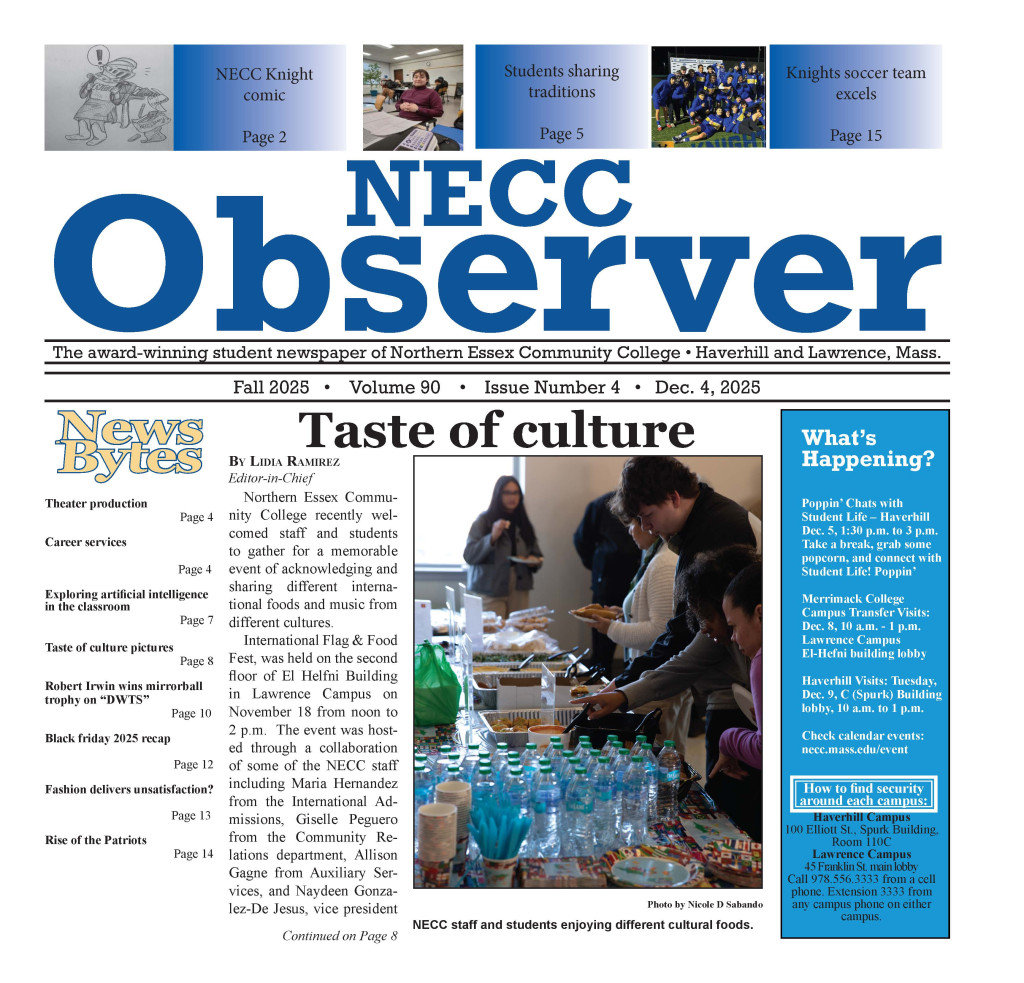
NECC alum Travis Jacobs, who graduated in 1998, founder and managing partner at The Jacobs Law LLC, came back to his alma mater to share his knowledge and experience as a lawyer specialist in business law and litigations with entrepreneurial students, on March 23.
As part of the BizTalks series, an event called “The Legal Side of Business” was held at the Business and Professional Studies Center, in Spurk – C building, Haverhill campus.
After years of studies and exercising in the legal field focusing on representing small businesses and entrepreneurs, Jacobs has been selected by Boston Magazine to its inaugural list of 2021 Top Boston Lawyers for Civil litigation.
After navigating the traffic from his Boston-based The Jacobss Law firm, the awarded lawyer made a master presentation called “Tapping Your Entrepreneurial Spirit” which was about what small businesses should know when establishing their company and how to avoid litigation.

Here are the basic steps for a business formation, according to Jacobs.
Entity name
Start by checking if the business name in mind is available. Make sure it is not a trademark, either by state or national, by visiting USPTO.gov.
Check online. Surf the web looking for a website, url, or through social media outlets if the chosen business name has not been already taken.
Did you know that you can reserve a name for your business before starting a business? When an idea comes up but not sure when to start, it is possible to reserve it for 60 days, paying a $30 fee to the Secretary of the Commonwealth of Massachusetts.
Key factors before choosing an entity type
Take a moment to think about what kind of business will be. For instance, it will provide professional services, or it will be a manufacturing company.
Ownership. Only one person or more people will be owners of the business. When opening a business with a relative or a friend, make sure to be clear about the responsibilities for each member of the company.
Think about the financing. The business will be open with savings or a loan. In the future, do you expect to ask for venture capitalists or investors to join your business?
Learn about tax and liability implications for each kind of business type.
Entity types
Here it is where it may be tricky, but Jacobs explained each type of business in a simple manner about
Corporations (INCs) need a series of documents such as by laws, shareholder agreements and articles of organizations. There are several types of corporate structures: C-Corp, S-Corp, Benefit Cor (BCs), Professional Corp (PCs) and Non-Profit Corporation (NPs)
Then Jacobs took us to the most popular legal frame, the Limited Liability Company (LLCs or PLLCs.) There are reasons for its popularity. It offers pass-through taxation and as its name says, offers limited liability to its owners that means personal assets are not compromised in case of debts or obligations. It is also easier to manage.
Partnerships is another type of entity for two members or more. It starts with a Partnership Agreement document. There are three kinds of partnerships: General (GP), Limited (LP) and Limited Liability Partnership (LLP)
The last ones on the list and least recommended entities are Sole Proprietorship and DBA (Doing Business As) as they do not offer personal liability protection. Sole Proprietorship is a legal structure as LLC or corporation, but DBA is not. Having a DBA does not even protect your DBA business name.
Understanding this information can be lengthy, Jacobs kept alive the audience’s interest by giving examples of different situations where business owners had gone through legal challenges, just for not having the right legal framework since the beginning of their entrepreneurial journey.
At the same time, students’ questions sparked at Spurk. When Jacobs brought up the concept of independent contractor from the employer and employee perspective, a business student wondered if he was mislabeled at the company he worked for as a sport trainer for a few hours a week. Jacobs explained the benefits for the business owner, no payroll nor insurance commitments for an employee under contract, but the employee is legally not compromised to wear uniforms or follow a schedule.
This opened a discussion about legal issues in the workplace. A communication student, who owns a single-member LLC, raised her concerns about how to hire staff if only needed for one or two days. Jacobs explained Massachusetts is an employee friendly state. However, as it is a high cost to hire a full-time or part-time employee with full benefits, in this case, most companies opt for contractors taking the risk the employee may or may not comply with working expectations. Jacobs recommended looking for a business lawyer advice to choose the right legal option for both employer and employee according to the nature of the business.
Jacobs also created legal awareness about customer’s data privacy. When asking for contact information to clients or potential clients, i.e., the subscribe button on a business website asking for mobile number or asking for a phone number to get into a raffle of your products or services online or in person, this must include a disclaimer that complies with the Telephone Consumer Protection Act (TCPA). This restricts the making of telemarketing calls and the use of automatic telephone dialing systems and artificial or prerecorded voice messages. Small business owners lose hundreds of millions of dollars every year for failing in this compliance.
For Anthony Jordan, an entrepreneurial student who will open soon his ninja-based concept gym, “Jordan Warriors,” this last information was his biggest takeaway. As his business will open on June 4, he is setting up all promotions to attract customers to his indoor training facility located at 140 Epic Rd. Exeter, New Hampshire, and his marketing plan includes asking for contact information from potential clients. “If you are collecting phone numbers, you need a disclaimer. Otherwise, the client can take you to court or cause a lot of troubles.” He noted that even for sending text messages, he will use a disclaimer.
The event exceeded the class time as it was full of insights and questions were kindly absolved by the renowned business lawyer.
Jacobs was an avid and tireless student. After he graduated from the Paralegal Program in 1998 in Northern Essex Community College, he transferred to Bentley University and obtained his bachelor’s degree in International Studies where he graduated summa cum laude.
He obtained his Juris Doctorate at Suffolk University Law School.
He holds a Master in Science in Development Economics and a Certificate in International Law from the London School.
To this day, Jacobs continuously receives recognition for his professional trajectory and has been appointed as board member for different organizations.
For contacting Jacobs, please visit his website, https://theJacobsslaw.com or email him tJacobss@theJacobsslaw.com
For the record, NECC used to have for over 30 years a paralegal associate degree and certificate program which closed in 2014.
Jacobs’ legal presentation was part of the important key points that are addressed in the Introduction to the Entrepreneurial Course given by Professor Sheila Muller, who organized this event.
As part of Muller’s course, students learn to write a business plan. In the process, they learn how to start a business, the types of entities there are, products or services they want to, create mission and vision statements, market research, and the financial side. “Each business plan’s step requires certain levels of insights. Each type of entity is related to tax and legal implications.
Also reporting annually. So, students need to know that before they decide” said Muller.
Students have the opportunity to have a CPA tax professional or an experienced lawyer to learn from. However, as BizTalks is open to all, students from different courses/degrees who were thinking about opening a business or already were business owners, benefited from this event.
For more more information about this course, contact Sheila Muller at smuller@necc.mass.edu.

